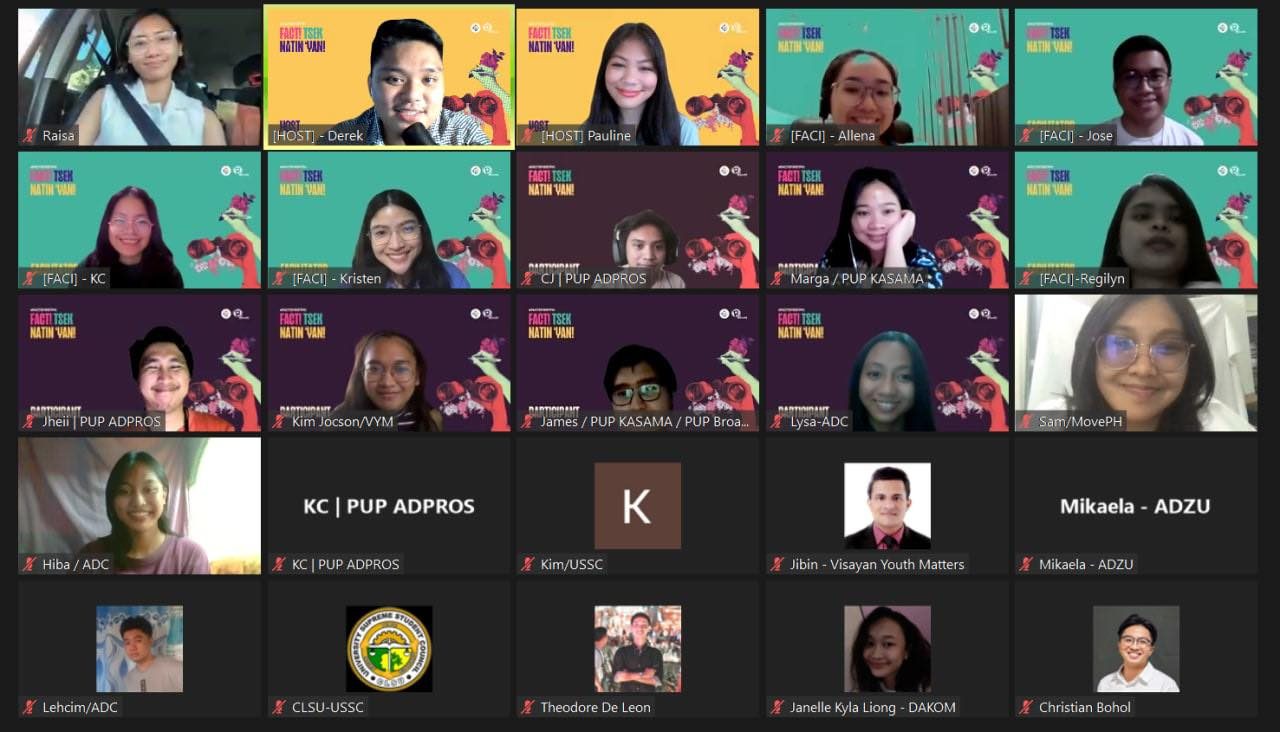SUMMARY
This is AI generated summarization, which may have errors. For context, always refer to the full article.

MANILA, Philippines – How do you talk to your friend if you spot them sharing false information? Do you comment, message privately, or let it be?
With the pervasiveness of disinformation on social media, fact-checking needs to be encouraged both in large-scale efforts and individual efforts, especially as the national elections draw near.
In a bid to encourage people to start conversations in their communities about fact-checking, a group of Movers under Rappler’s civic engagement arm MovePH launched a workshop titled “Fact! Tsek natin ‘yan!” on Saturday, April 23. During this workshop, they shared tips on how to take on a person-to-person approach to fact-checking.
The workshop was also organized as part of the #FactsFirstPH initiative, a multi-sectoral initiative that aims to promote truth and fight disinformation.
Person-to-person approach
In his talk, Christian Bohol, a Lead Mover under Rappler and among the organizers of the workshop, emphasized how the “person-to-person” approach is especially important to combat disinformation both on the ground and online.
Nearly half of Filipinos get their news from the internet and 51% of Filipinos find it difficult to spot fake information across all media platforms.
The algorithm of social media platforms can allow people to exist in echo chambers, where they see content only from those they agree with. This is often used to the advantage of propaganda networks that disseminate false narratives and emotion-stirring content.
“Hindi lahat ng tao may access sa [tamang information] sa Internet…Kaya natin ilulunsad yung tao-sa-tao kampanya ay para mas maging mapanuri pa sila sa mga nababasa at naririnig nilang impormasyon,” Bohol said.
(Not all people have access to the right information available on the Internet. That is why we need to launch a person-to-person campaign so they would be critical of the information that they read and hear.)
When spotting a friend or acquaintance sharing false information online, Bohol suggested people to follow the 5 M’s: magpakilala (introduce one’s self), makinig (listen), makipag-usap (converse), manindigan (uphold the truth), and manalig (trust).
These elements spark empathy which is integral in the process of persuasion.
Making people feel that they are understood and acknowledged encourages them to have an open mind when engaging in discussions and fact-checking statements— an effort that needs to be exercised specially with the coming elections.
Challenges
Talking to people about fact-checking and pointing out that what they shared online is false or misleading can be difficult.
Several participants of the “Fact! Tsek Natin ‘Yan” workshop shared the challenges they faced as they grappled with the impact of disinformation in their social circles. This becomes even more challenging when authority figures in their communities are also among those sharing false information.
“It is very frustrating,” said Hiba Myla Engay from the Ateneo Debate Congress who was in disbelief after sharing her experience of encountering teachers who are purveyors of false information.
“They are the educators…but for some reason, they are the ones who swallow misinformation and spread it to people. It is very dangerous for some reason,” Engay lamented.
Both Margarita Pablo of PUP Kasama and Carl Lehcim Genito from Ateneo Debate Congress mentioned that the youth are having a hard time dealing with elders who keep sharing false information.
For Pablo, the generation gap between the elderly and the youth separates their supposedly shared ideals or beliefs.
Genito, on the other hand, mentioned how some seniors display superiority complexes.
“They think that since they’re older, they are wiser – everything they say and everything that they do is correct even if there are some parts of it that aren’t actually correct, ” he said.
Although these experiences have shown the struggles amid engaging in factual discourse as online disinformation permeates through our social circles, there are other ways we can combat falsehoods aside from following the person-to-person approach.
Taking the helm of truth
These challenges should not deter Filipinos from taking action in debunking lies, both in the digital space and in our communities.
Raisa Serafica, unit head of civic engagement at Rappler, highlighted the three-pronged framework of the #FactsFirstPH initiative. This involves debunking dubious claims, amplifying facts, and protecting truth-tellers by holding authorities accountable.
All these can be coupled with a “person-to-person” approach in the battle for facts at the macro and micro levels.
One can take part in combating disinformation by sending links to misleading claims to the #FactsFirstPH tipline and sharing fact-checked content to our families and friends, as well as engaging in meaningful discourse with our communities to rise above information manipulation.
“Not only do we have to pierce through our echo chamber, but we have to amplify one another. Through reaching out to people we know, there is a bigger chance to influence and convince them to [turn to facts],” Serafica said.
That is why Filipinos must work together to promote facts and drown the lies. No task is too small when communities unite to fight disinformation.
“We can count on Filipinos to push back,” Serafica added. – with reports from Jose Orlando Polon and Kristen Matias/Rappler.com
Jose Orlando Polon is a Rappler intern from De La Salle Lipa. He is a senior taking up Bachelor of Arts in Communication, Major in Socio-Cultural and Behavioral Communication.
Kristen Matias is a Rappler volunteer from the Ateneo De Manila University. She is a junior pursuing a Bachelor of Science Degree in Legal Management, and Minor Degrees in English Literature and Development and the Law.
Add a comment
How does this make you feel?



![[New School] Tama na kayo](https://www.rappler.com/tachyon/2024/02/new-school-tama-na-kayo-feb-6-2024.jpg?resize=257%2C257&crop=290px%2C0px%2C720px%2C720px)
![[Only IN Hollywood] After a thousand cuts, and so it begins for Ramona Diaz and Maria Ressa](https://www.rappler.com/tachyon/2024/02/Leni-18.jpg?resize=257%2C257&crop=262px%2C0px%2C720px%2C720px)
There are no comments yet. Add your comment to start the conversation.